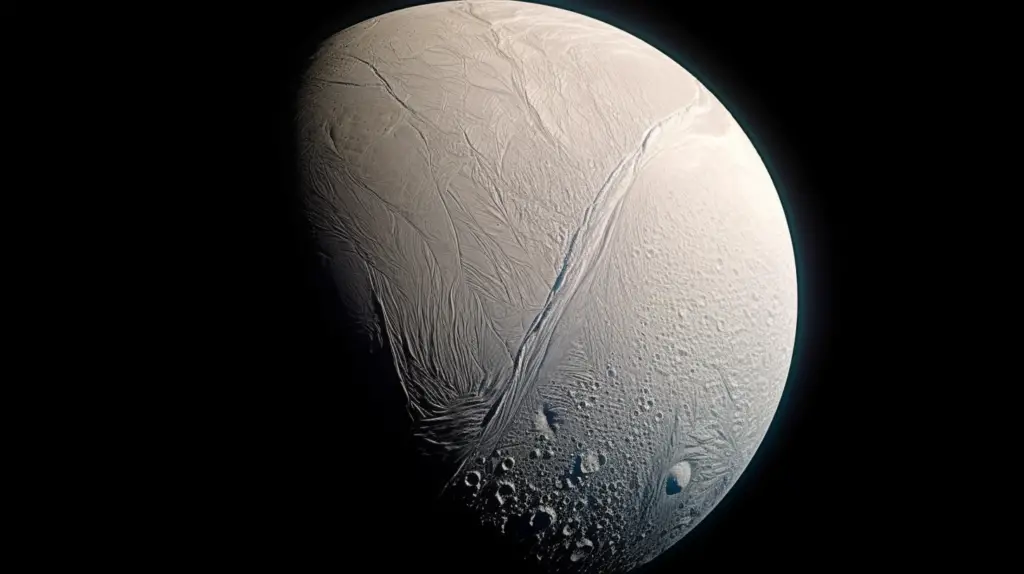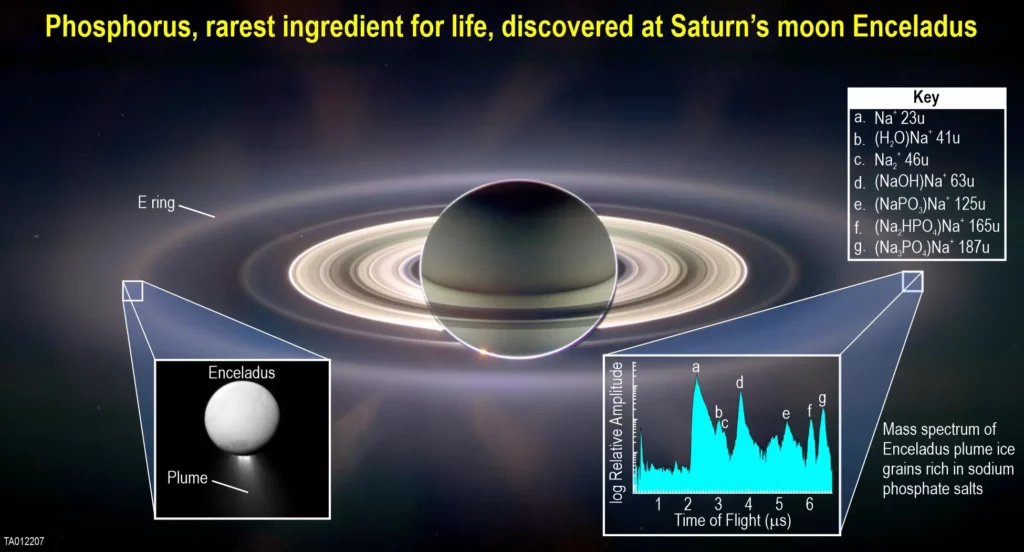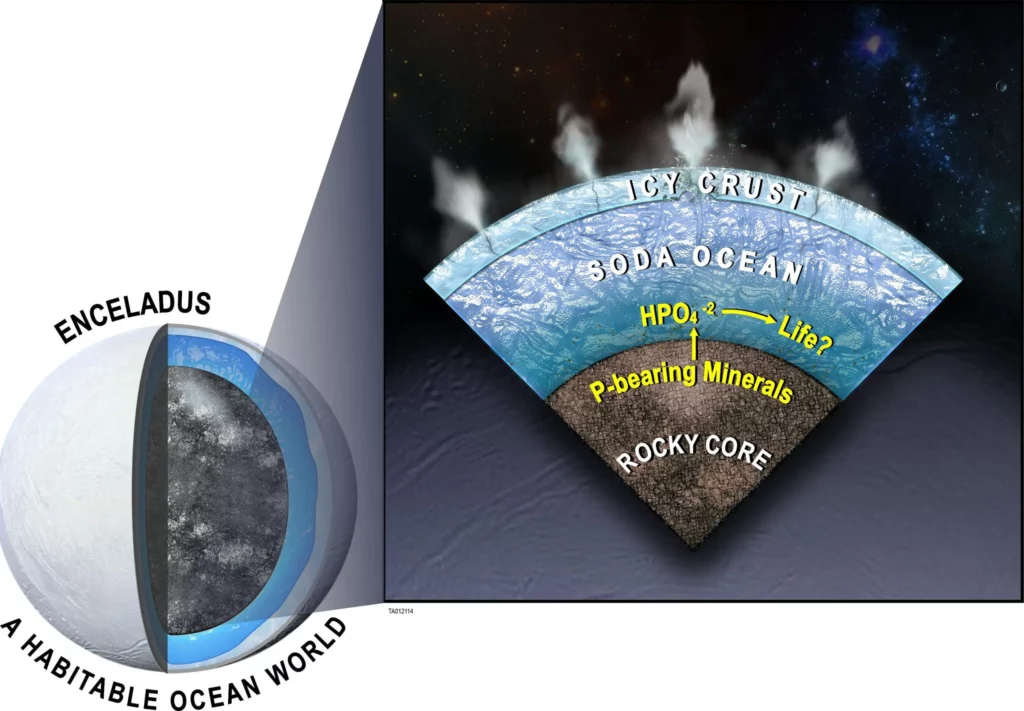Astronomers have detected, a critical life component, phosphate on Saturn’s moon Enceladus, marking a significant step forward in the search for extraterrestrial life.

Table of Contents
A Groundbreaking Discovery: Phosphate on Saturn’s moon Enceladus
In a groundbreaking discovery that has sent ripples through the scientific community, astronomers have detected the presence of phosphate, a critical component for life, in the subsurface ocean of Saturn’s moon Enceladus. This discovery of phosphate on Saturn’s moon Enceladus has sparked renewed interest in the search for extraterrestrial life, as it provides compelling evidence of the moon’s potential habitability.
Watch it as a video instead of reading:
JWST’s Groundbreaking Discovery: Possible Water on Super-Earth GJ 486 b
The Role of Phosphates in Life
Phosphate is vital for all life on Earth. It forms the backbone of DNA and RNA, the genetic material that carries the instructions for life. It is also a key component of ATP (adenosine triphosphate), the molecule that provides energy for cellular processes, and phospholipids, which form the membranes of cells. The discovery of phosphates on Saturn’s moon Enceladus is the first to report direct evidence of phosphorus on an extraterrestrial ocean world, making it a significant milestone in astrobiology.

The Cassini Mission and the Detection of Phosphates
The detection of phosphates on Saturn’s moon Enceladus was made possible by data from NASA’s Cassini mission. Launched in 1997, Cassini spent 13 years exploring Saturn, its rings, and its moons. One of its most significant discoveries was the detection of a subsurface ocean on Enceladus, which was confirmed by the spacecraft’s observations of geysers erupting from the moon’s south pole. These geysers spew water ice particles into space, some of which supply Saturn’s E ring.
The Cassini spacecraft was equipped with the Cosmic Dust Analyzer, which analyzed individual ice grains emitted from Enceladus and sent those measurements back to Earth. In the new study, researchers used data collected from Cassini’s Cosmic Dust Analyzer. They found sodium phosphate molecules in 9 of 345 ice grains Cassini analyzed as it passed through Saturn’s outer E ring.

Phosphate on Saturn’s Moon Enceladus: A Major Step Forward in Astrobiology
The detection of phosphates on Saturn’s moon Enceladus is a stunning result for astrobiology and a major step forward in the search for life beyond Earth. The high concentration of phosphates in Enceladus’ ocean satisfies one of the strictest requirements in establishing whether celestial bodies are habitable.
Implications of the Discovery
The discovery of phosphate on Saturn’s moon Enceladus reinforces the idea of the potential habitability of ice-covered ocean worlds across the solar system, beyond surface ocean worlds like Earth. Worlds with an interior ocean like Enceladus can occur over a much wider range of distances, greatly expanding the number of habitable worlds likely to exist across the galaxy.
This discovery has profound implications for our understanding of where life might exist beyond Earth. It suggests that the conditions necessary for life as we know it could exist on moons and planets far from the warmth of their parent star, in the cold depths of subsurface oceans.
The Future of Extraterrestrial Life Search
With the discovery of phosphates on Saturn’s moon Enceladus, the next step is clear – we need to go back to Enceladus to see if the habitable ocean is actually inhabited. This finding has made the search for extraterrestrial life in our solar system more exciting and promising.
Future missions to Enceladus could involve landers or even submarines designed to probe its subsurface ocean. Such missions could collect and analyze samples directly from the ocean, potentially detecting signs of life such as microorganisms or organic molecules.
Phosphate on Saturn’s Moon Enceladus: A New Frontier in Astrobiology
The discovery of phosphate on Saturn’s moon Enceladus is a new frontier in astrobiology. It opens up a new avenue of research into the conditions that make a world habitable and the potential for life to exist in environments very different from those on Earth.
The presence of phosphates on Enceladus suggests that the moon’s ocean could have the right chemistry to support life. It also raises the tantalizing possibility that other icy moons and planets in our solar system and beyond could harbor life.
Conclusion
The detection of phosphates on Saturn’s moon Enceladus is a significant step forward in our quest to find life beyond Earth. It provides compelling evidence that Enceladus, and perhaps other icy moons and planets, could harbor the conditions necessary for life. As we continue to explore our solar system and beyond, the discovery of phosphate on Saturn’s moon Enceladus serves as a reminder of the potential for life to exist in the most unexpected places.
Reference(s):

